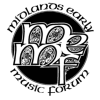Next workshop to look forward to is on 2nd March. Here’s an opportunity to work on some less familiar pieces by two great masters of English renaissance music, Thomas Tallis (1505-85) and William Mundy (1529-1591). Tallis is much the better-known of these two, having composed some of the best-loved and most-performed music of its period; his music has in the last decade been recorded in its entirety and his celebrated forty-part motet Spem in Alium has become almost a pop classic. Mundy, a generation or so later than Tallis, is a more obscure figure, less of whose music has been performed and recorded, undeservedly so, since he was a fine composer. A final selection of pieces has not yet been made, but we hope to look at one or two large-scale works by these composers, or at any rate by Tallis. Possibilities include the motets Suscipe Quaeso, Videte Miraculum, Forgive me Lord my Sin, Gaude Gloriosa (we could easily spend a whole workshop on this piece alone), and Magnificat (Anglican Latin setting) all by Tallis, and Mundy’s Adolescentulus Sum Ego, In te Domine Speravi, and Nunc Dimittis to Mr Parsons. Some of these are pieces which, perhaps because of their difficulty and sheer length (Suscipe and Videte last about ten minutes, Gaude fifteen or more, and the middle sections of Gaude are reduced voices) get less of an airing than they should.
Our tutor for this event is Alistair Dixon, founder and director of the vocal ensemble Chapelle du Roi and an experienced conductor and workshop director. Alistair and Chapelle have together recorded all of Tallis’s music on ten CDs, a monumental achievement, so his expertise and authority in this repertoire is unquestionable. Alistair has directed a number of successful workshops for MEMF over the years but none recently, so it is good to welcome him back now.
Singers will be required in all voice parts. Scores will be provided. Booking form is available to print off from the Events Diary.

